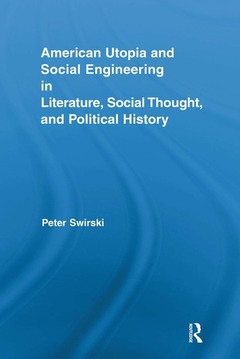Description
American Utopia and Social Engineering in Literature, Social Thought, and Political History
Routledge Transnational Perspectives on American Literature Series
Author: Swirski Peter
Language: English
Subjects for American Utopia and Social Engineering in Literature...:
Keywords
thanatos; syndrome; cuckoo's; nest; walker; percy; selfi; gene; brain; ngerprinting; Young Man; Grand Theft Auto; Cuckoo’s Nest; Los Horcones; Good Life; Vice Versa; Twin Oaks; Thanatos Syndrome; Knight Errant; Carrie Buck; Direct Democracy; Contemporary Society; IQ Test; Blue Boy; Democratic Weimer Republic; Congo Free State; Big Nurse; Nation Building; Brain Fingerprinting; Team USA; Administration Bush Ii; American Utopia; Multilevel Selection; Country’s Voting System; Bush II
Publication date: 11-2012
Support: Print on demand
Approximative price 172.36 €
In Print (Delivery period: 14 days).
Add to cartPublication date: 05-2011
Support: Print on demand
Description
/li>Contents
/li>Readership
/li>Biography
/li>
The United States today is afflicted with political alienation, militarized violence, institutionalized poverty, and social agony. Worst of all, perhaps, it is afflicted with chronic and acute ahistoricism. America insist on ignoring the context of its present dilemmas. It insists on forgetting what preceded the headlines of today and on denying continuity with history. It insists, in short, on its exceptionalism.
American Utopia and Social Engineering sets out to correct this amnesia. It misses no opportunity to flesh out both the historical premises and the political promises behind the social policies and political events of the period. These interdisciplinary concerns provide, in turn, the framework for the analyses of works of American literature that mirror their times and mores.
Novels considered include: B.F. Skinner and Walden Two (1948), easily the most scandalous utopia of the century, if not of all times; Ken Kesey?s One Flew Over the Cuckoo?s Nest (1962), an anatomy of political disfranchisement American-style; Bernard Malamud?s God?s Grace (1982), a neo-Darwinian beast fable about morality in the thermonuclear age; Walker Percy?s The Thanatos Syndrome (1986), a diagnostic novel about engineering violence out of America?s streets and minds; and Philip Roth?s The Plot Against America (2004), an alternative history of homegrown ?soft? fascism.
With the help of the five novels and the social models outlined therein, Peter Swirski interrogates key aspects of sociobiology and behavioural psychology, voting and referenda procedures, morality and altruism, multilevel selection and proverbial wisdom, violence and chip-implant technology, and the adaptive role of emotions in our private and public lives.
Introduction. Life Is More Important Than Art or Social Engineering, Eutopia, and Evolution 1. How I Stopped Worrying and Loved Behavioural Engineering or Communal Life, Adaptations, and B.F. Skinner’s Walden Two 2. You’re Not in Canada until You Can Hear the Loons Crying or Voting, People’s Power, and Ken Kesey’s One Flew over the Cuckoo’s Nest 3. You’ll Never Make a Monkey Out of Me or Altruism, Proverbial Wisdom, and Bernard Malamud’s God’s Grace 4. We Better Kill the Instinct to Kill Before It Kills Us or Violence, Mind Control, and Walker Percy’s The Thanatos Syndrome 5. It Can’t Happen Here or Politics, Emotions, and Philip Roth’s The Plot against America
Peter Swirski is Research Director at the Helsinki Collegium for Advanced Studies and Professor of American Literature and Culture at UMSL. He is the author of ten acclaimed books in American Literature and American Studies, among them the bestselling From Lowbrow to Nobrow (2005) and Ars Americana, Ars Politica (2010).




